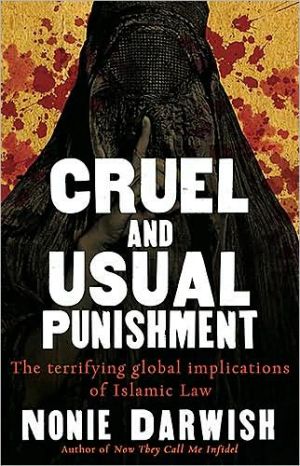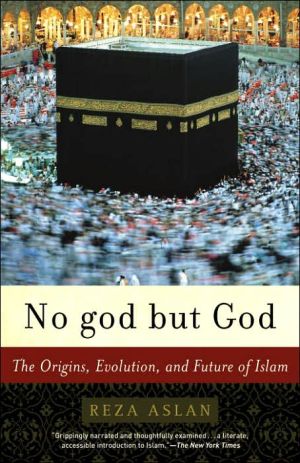Marching Toward Hell: America and Islam after Iraq
When Michael Scheuer first questioned the goals of the Iraq War in his 2004 bestseller Imperial Hubris, policymakers and ordinary citizens alike stood up and took notice. Now, Scheuer offers a scathing and frightening look at how the Iraq War has been a huge setback to America's War on Terror, making our enemy stronger and altering the geopolitical landscape in ways that are profoundly harmful to U.S. interests and security concerns.\ Marching Toward Hell is not just another attack on the...
Search in google:
When Michael Scheuer first questioned the goals of the Iraq War in his 2004 bestseller Imperial Hubris, policymakers and ordinary citizens alike stood up and took notice. Now, Scheuer offers a scathing and frightening look at how the Iraq War has been a huge setback to America's War on Terror, making our enemy stronger and altering the geopolitical landscape in ways that are profoundly harmful to U.S. interests and security concerns. Marching Toward Hell is not just another attack on the Bush administration. Rather, it sounds a critical alarm that must be heard in order to preserve the nation's security. Scheuer outlines the ways that America's foreign policy since the end of the Cold War has undermined the very goals for which we are fighting and played right into bin Laden's hands. The ongoing instability in Iraq, for example, has provided al Qaeda and its allies with the one thing they want most: a safe haven from which to launch operations across borders into countries that were previously difficult for them to reach. With U.S. forces and resources spread thinner every day, the war has depleted our strength and brought al Qaeda a kind of success that it could not have achieved on its own. A twenty-plus-year CIA veteran, Scheuer headed the agency's Osama bin Laden unit, managed its covert-action operations, and authored its rendition program. Scheuer spent his career developing strategies to keep America safe, by any means deemed necessary by the presidents he served. It was his job to take available intelligence and devise plans to protect Americans, without considering bias, position, or even existing alliances. In Marching Toward Hell, Scheuertakes on the questions of "What went wrong?" and "How can we fix this?" and proposes a plan to cauterize the damage that has already been done and get American strategy back on track. He lists a number of painful recommendations for how we must shift our ideological, military, and political views in order to survive, even if that means disagreeing with Israeli policy or launching more brutal campaigns against terrorists. America holds its destiny in its hands, Scheuer says, yet not nearly enough has been done to defend America and destroy its Islamist enemies. This is an eye- opening, alarming, contentious, and ultimately fascinating examination of how far off track the War on Terror has gone, and a critical read in understanding what we must do to save it. Publishers Weekly Scheuer, former CIA analyst and trenchant critic of U.S. terrorism policies (Imperial Hubris) develops his argument that America suffers from a collective insistence on sustaining Cold War paradigms in a fundamentally altered world. For all its culpable errors, the current administration is merely the present-day incorporation of "willful historical ignorance, a paucity of common sense, and... a disastrous degree of intellectual hubris." These fundamental shortcomings are exacerbated by a pattern of making policy decisions on the basis of how a liberal-pacifist media and intelligentsia will react, rather than objectively considering the national interest. That interest, Scheuer argues, requires prioritizing the Islamic threat in security considerations and understanding that it does not manifest intractable, theologically based hostility to American values and lifestyles. The Islamic challenge instead reflects a series of concrete U.S. policy decisions, beginning in 1973, committing the U.S. to supporting an endless war to the death between Arabs and Israelis. An increasingly desperate effort to sustain a fundamental regional imbalance-and Scheuer does not spare the Clinton administration-has led to direct military involvement, culminating in the debacles of Iraq and Afghanistan. These defeats, Scheuer declares, are the inevitable result of seeking to change the Middle East's dynamics by exporting the unique American patterns of democracy and republicanism. Controversial in its details, Scheuer's analysis suffers fundamentally from "Occidentalism." Interpreting Islamic behavior as a consequence of American actions keeps the U.S. at the center of events in precisely the Cold Warmodel Scheuer excoriates. (Feb. 12) Copyright 2007 Reed Business Information
Introduction\ [E]vents started by human folly link themselves in a sequence which no sagacity can foresee and no courage can break through.\ Joseph Conrad, 1911\ It is painful enough to discover with what unconcern they speak of war and threaten it. I have seen enough of it to make me look upon it as the sum of all evils.\ Major General T. J. Jackson, 1862\ In two previous books and numerous articles, I have tried to explain and defend my conclusion that U.S. political leaders from both parties and American citizens generally have misunderstood the motivation of Osama bin Laden, al- Qaeda, and their steadily increasing number of Islamist allies. My argument, simply stated, was and is that Islamist militants are attacking America because of what it does in the Islamic world and not because of the way America's people think, vote, behave, and believe or not believe in God. I readily acknowledge that many of the Islamists confronting us detest our society and lifestyle and would never duplicate them in any country they would govern. Clearly, there would be nothing akin to MTV, gender equality, or quadrennial presidential elections in an al-Qaeda-run Saudi Arabia.\ But granting that reality, I argued that it was a profound and unnecessary mistake, an instance of what Conrad called "human folly," to believe that the Islamist militants' animosities for the accoutrements of our society were the main motivating and unifying factors behind their hatred and willingness to wage war against the United States. Such an error, moreover, would cause U.S. leaders and citizens to grossly underestimate the threat they faced from the Islamists, lead them to deploy insufficient military force, and stand pat on untenable foreign policies, thereby leading to America's defeat. It would be better, I argued, to face the unpleasant reality head on and recognize that the forces led and personified by Osama bin Laden are motivated and united by an ever- deepening hatred for the impact of U.S. foreign policy in the Muslim world. Unqualified support for Israel, a half-century of protecting and nurturing Muslim police states, and a military presence in Muslim lands — these were the tangible, physical manifestations of U.S. foreign policy that are perceived by most — yes, definitively, most — Muslims as a concerted and deliberate attempt to destroy Islam and its followers. This formulation was meant to alert Americans to what I saw as an existential threat to the United States that was in some ways greater than that which had been posed by the Soviet Union. It was more dangerous because it came from an opponent that was far less easy to define, one who, unlike the USSR, had virtues and a thoroughly human and egalitarian theology, and one that was all but impossible to contain and deter.\ My arguments were not meant to be a condemnation of U.S. leaders, policymakers, and their foreign policy as mad, evil, or imperialistic. My goal was simply to suggest that our foreign policies toward the Muslim world had been in place for a very long time, some for more than thirty years, and had run out of gas; that they were not doing the only thing U.S. foreign policies must do: ensure the protection and promote the expansion of liberty and freedom at home, keep America as safe as possible from external attack, and serve as a model of responsible and humane self-government for those abroad who might choose to emulate it.\ More often than not my writings were used by pundits as prime examples of raw America-hating, cowardly appeasement, anachronistic isolationism, and fierce anti-Semitism. Well, so be it. If putting forward a belief that holds U.S. national security interests to be a limited and narrowly defined set of life- and-death issues wins for me such ugly and meant-to-be debate-halting monikers so prized by the U.S. governing elites, I will listen, dismiss them, and press on.\ In deciding to research and write a third book that falls into the category of the United States versus the forces led and inspired by Osama bin Laden, I became increasingly interested in and finally fixed on a single question: "Is the protection of U.S. interests and American citizens, and the maintenance of American sovereignty, independence, and freedom of action, any longer the primary, overriding concern of the U.S. federal government?" The answer should obviously be an emphatic yes, at all times and on every issue. And yet the more I read, researched, and encountered the discrepancy between the words and deeds of U.S. leaders, and especially the vast gulf between their description of the world and the world as I perceived it, the more I became doubtful that the answer to the pivotal question above could be even a timid yes.\ In the obsession with national security that has consumed Americans and their leaders since the 9/11 attacks on New York and Washington, we seem to have fallen into the belief not only that the world changed forever on that date but also that nothing before that date contributed to the events of 9/11 or those that have ensued. In part this is because, as I noted above, we have refused to frankly assess whether the cumulative impact of thirty-plus years of U.S. foreign policies in the Muslim world may have helped to motivate the Islamists who attacked on 9/11 in the name of defending their faith and brethren. In this regard, and to paraphrase the venerable Satchel Paige, our elites seem afraid to look over their shoulders because the truth might be gaining on them. Also contributing to this situation is the fact that most Americans have a difficult time imagining they are anything but good-hearted and benign, or that their impact on the world is anything but generous and uplifting. Cynically, our governing elites use this ingrained predisposition to condemn and defame those who suggest that U.S. policies helped to encourage our enemies on their path to 9/11 and beyond. Our elites, after all, have been the craftsmen, purveyors, and defenders of these policies for three-plus decades, and it is much less dicey in terms of unpleasant domestic political repercussions to savage those critical of their policies by dismissing them as blame-America-firsters.\ Still, even accepting that our national self-esteem and our politi-cal leaders' political fortunes are most easily protected by maintaining the foreign-policy status quo, this did not seem a satisfactory excuse for what my research suggested was a deepening reluctance to make the protection of U.S. interests and citizens the federal government's top priority, and an almost blasé acceptance of war for purposes unconnected to America's national interests. And reluctance is not even the right word to use; it seems rather a combination of shame, embarrassment, and fear of employing American resources to protect Americans. The more I read and reflected on my own two-plus decades of service at the Central Intelligence Agency (CIA), the more likely it seemed that the answer to the question, "Does protecting Americans come first?" is very plainly no. The organizing concept of the federal government is no longer, as the Founders intended, the protection and expansion of freedom, liberty, and the rule of law at home, with a foreign policy, backed when necessary by military force, designed to ensure the maintenance of that domestic environment. "The Founding Fathers," the brilliant historian Walter A. McDougall has reminded his fellow citizens, "flatly denied that the United States ought to be in the business of changing the world, lest it only change itself — for the worse.... [T]hey saw foreign policy as an instrument for the preservation and expansion of American freedom and warned that crusades would belie our ideals, violate our true interests, and sully our freedom." Today, however, the federal government's organizing principle flows directly from the country's pop culture; namely, the federal government, under Republican or Democratic control, does what is easiest, most expedient, least risky, politically correct and opportune, and most sellable. In the present case, these actions are anchored in neither the Founders' intent nor any significant knowledge of American history or the history of the Muslim world.\ In essence, U.S. independence and safety are now threatened by our elites consistently asking the wrong question about national-security policy. Instead of asking what could happen if we do not respond in a timely manner and eliminate a particular threat to the United States — that is, what will the failure to act cost America in lives and treasure? — U.S. governing elites ask what will happen if they do act to defend America. The answer to the first question is very substantive and specific. For example, if President Bill Clinton fails to kill Osama bin Laden in the late 1990s, and if President George W. Bush fails to kill Abu Musab al-Zarqawi before March, 2003, both will live to have the chance to execute the deadly actions against the United States they repeatedly promised. Thus, it seems to be only common sense to say that it is better to try to kill bin Laden and al-Zarqawi and fail than not to try at all. The answer to the second question is usually another set of questions from U.S. political leaders and senior bureaucrats that stress the negative political costs that could accrue to U.S. leaders who authorize such actions when the actions subsequently fail to achieve their aim. Using the case of bin Laden, these questions include: "What will the world think of us if we attack and miss? Won't the Europeans view us as hip-shooters? If innocents get killed, won't we alienate Europeans, Muslims, or fill-in-the-blank others around the world?" Summing the answers to such questions usually yields paralysis or an action that is ineffective and that allows — and sometimes encourages — those behind the danger at hand to become more confident, bolder, and increasingly lethal.\ I refer here to the bin Laden and al-Zarqawi cases because I am familiar with them on a direct, first-hand basis, but it is easy to see what inaction or ineffective action has yielded in the cases of North Korea and Iran and in the failure to annihilate Saddam Hussein's Iraq in 1991. In short, the reason the U.S. federal government does not put the protection of America first is that our governing elites do not believe the United States is worth defending if the world audience they are playing to will criticize the actions they take in America's interests. Our current elite — including the second Bush administration, which talks tough but refuses to kill the numbers of enemies needed to win America's wars — takes its guidance on how and when to protect America from its estimate of how the liberal Western media will react and National Public Radio's pacifist theory of international relations, not from The Federalist Papers or Washington's Farewell Address.\ This reality, I think, goes far toward explaining the series of unmitigated overseas disasters that America has experienced since September 11, 2001. In an almost mindless way, the making of U.S. national security and defense policy for much of the past three decades has followed the path of least resistance, which happened likewise to be the path of least effectiveness. The single, awe- inspiring exception to the rule was Ronald Reagan's decision to use his best judgment to buck the status quo politicians, diplomats, intelligence officers, academics, and pundits and try to terminate the seemingly endless Cold War by using the truth and the wondrously productive U.S. economy to break Mikhail Gorbachev and the Soviet Union. This effort stands out even more starkly because Mr. Reagan's administration in many ways was not much different from its predecessors and successors in choosing the paths of least resistance for its overall foreign policy, especially in such traditional stand-pat areas as Israel, energy policy, and support for Arab tyrannies.\ Mr. Reagan, more than any other American leader in our lifetime, recognized and exploited the enormous gap between the hardworking, insular, can-do, tough, and goal-oriented American people and their soft, fearful, and antinationalist bipartisan elites. Reagan's rhetoric and personal rapport with Americans intimidated the perpetually fearful elites and allowed him to reach past them and carry Americans with him as he successfully attained the end-state that is so foreign, feared, and lacking in sophistication to our elite — the scoring of a complete and utter victory for America by annihilating the USSR. Reagan's personal courage was such that at the Reykjavik Summit he simply stood up and walked away from a disbelieving Mikhail Gorbachev when the latter's take-it-or- leave-it offer failed to protect U.S. security; he knew full well that the Western media and elites would rake him mercilessly over the coals for not wanting peace at any price. So out of character was such decisiveness, integrity, and clarity of thought and purpose in post-Vietnam U.S. politics — and so appalled were our elites by the risks Reagan prudently but cheerfully took — that the professorate has spent the last twenty years trying to prove Reagan never really existed, that the out-of-luck, nuclear gangster Gorbachev was the real hero of the moment, or that both sides held equal moral responsibility for the Cold War. Bosh. Reagan won for America hands down; he said the only acceptable outcome of the Cold War was "we win and they lose," and he delivered that end-state. Indeed, so definitive and durable was Reagan's victory that it has taken twelve years of Bush presidencies and eight years of Clintonism to completely squander Reagan's achievement and legacy.\ The high point of Reagan's presidency — destroying Gorbachev and the Bolsheviks — stands in stark contrast to the general conduct of non-Cold War specific U.S. foreign policy since 1973. From that year until 2001, U.S. foreign policy was conducted on the basis of political expediency: popularity maintained, with few risks taken, little offense given, and none but the Soviet threat eliminated. U.S. national-security interests in the era were frequently proclaimed, discussed, and legislated, but they were seldom defended. During these thirty- plus years, the U.S. government disinvested in national security by assuming that the status quo in which its foreign policies operated was permanent, refusing to destroy the emerging Islamist threat to the nation, and consistently expanding the list of pseudo-national-security interests to include such American domestic priorities but hardly life-and-death foreign-policy issues as human rights, spreading democracy, religious freedom, nation-building, and women's rights. By 2001, when the stage was set for al-Qaeda to attack New York and Washington, the United States was bound by a series of commitments that all but negated its freedom of maneuver and left it facing a slate of long-ignored, festering threats, armed with an outdated and innovation-restricting set of foreign policies. As a result, the 9/11 attacks found America so hobbled that its government was unable to draft and implement a focused, coherent, and effective response that promised victory. America is today less secure than it was on what al-Qaeda refers to as "the Tuesday of God's glory" because its post- 1973 leaders, as Machiavelli wrote in 1513, never "reflected in tranquil times that there might come a change (and it is human nature when the seas are calm not to think of storms)."\ Copyright © 2008 by Michael Scheuer
Introduction to the Paperback Edition: The More Things Change . . . xiPreface xxiiiIntroduction 1Author's Note 9Part Getting to 9/11Chapter 1 Readying bin Laden's Way: America and the Muslim World, 1973-1996 21Chapter 3 Fighting Islamists with a Blinding Cold War Hangover, 1996-2001 55Part II Six Years of War, 2001-2007Chapter 3 Afghanistan-A Final Chance to Learn History Applies to America 99Chapter 4 Iraq-America Bled White by History Unlearned 117Chapter 5 And the Islamists' Fire Quietly Spreads 147Part III Where Stands the War?Chapter 6 "The bottom is out of the tub": Taking Stock for America in 2008 189Chapter 7 "O enemy of God, I will give thee no respite": Al-Qaeda and Its Allies Take Stock 215Part IV Where to from Here?Chapter 8 A Humble Suggestion-America First 249Epilogue An Abiding Uniqueness 267Notes 271Bibliography 333Index 351
\ From Barnes & NobleMichael Scheuer began his public writing career in anonymity. His first two books (Through Our Enemies' Eyes; Imperial Hubris) were both published anonymously: As a 22-year employee of the Central Intelligence Agency and former head of the CIA's Osama Bin Laden unit, Scheuer knew that he was expected to keep his expert conclusions private. Now out in the open, this outspoken anti-terrorism analyst has attacked officials and candidates across party lines. In Marching to Hell, he explains how American foreign policy since the end of the Cold War have undermined our goals and played into the hands of our enemies. He argues that the Iraqi adventure has provided al Qaeda and its allies with new bases for further attacks.\ \ \ \ \ Publishers WeeklyScheuer, former CIA analyst and trenchant critic of U.S. terrorism policies (Imperial Hubris) develops his argument that America suffers from a collective insistence on sustaining Cold War paradigms in a fundamentally altered world. For all its culpable errors, the current administration is merely the present-day incorporation of "willful historical ignorance, a paucity of common sense, and... a disastrous degree of intellectual hubris." These fundamental shortcomings are exacerbated by a pattern of making policy decisions on the basis of how a liberal-pacifist media and intelligentsia will react, rather than objectively considering the national interest. That interest, Scheuer argues, requires prioritizing the Islamic threat in security considerations and understanding that it does not manifest intractable, theologically based hostility to American values and lifestyles. The Islamic challenge instead reflects a series of concrete U.S. policy decisions, beginning in 1973, committing the U.S. to supporting an endless war to the death between Arabs and Israelis. An increasingly desperate effort to sustain a fundamental regional imbalance-and Scheuer does not spare the Clinton administration-has led to direct military involvement, culminating in the debacles of Iraq and Afghanistan. These defeats, Scheuer declares, are the inevitable result of seeking to change the Middle East's dynamics by exporting the unique American patterns of democracy and republicanism. Controversial in its details, Scheuer's analysis suffers fundamentally from "Occidentalism." Interpreting Islamic behavior as a consequence of American actions keeps the U.S. at the center of events in precisely the Cold Warmodel Scheuer excoriates. (Feb. 12)\ Copyright 2007 Reed Business Information\ \








